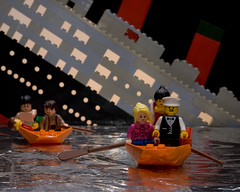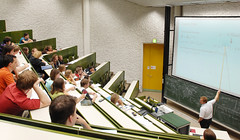
Speakers: Ladd Brown, Andi Ogier, and Annette Bailey, Virginia Tech
Libraries are not about the collections anymore, they’re about space. The library is a place to connect to the university community. We are aggressively de-selecting, buying digital backfiles in the humanities to clear out the print collections.
Guess what? We still have our legacy workflows. They were built for processing physical items. Then eresources came along, and there were two parallel processes. Ebooks have the potential of becoming a third process.
Along with the legacy workflows, they have a new Dean, who is forward thinking. The Dean says it’s time to rip off the bandaid. (Titanic = old workflow; iceberg = eresources; people in life boats = technical resources team) Strategic plans are living documents kept on top of the desk and not in the drawer.
With all of this in mind, acquisitions leaders began meeting daily in a group called Eresources Workflow Weekly Work, planning the changes they needed to make. They did process mapping with sharpies, post-its, and incorporated everyone in the library that had anything to do with eresources. After lots of meetings, position descriptions began to emerge.
Electronic Resource Supervisor is the title of the former book and serials acquisitions heads. The rest — wasn’t clear from the description.
They had a MARC record service for ejournals, but after this reorganization process, they realized they needed the same for ebooks, and could be handled by the same folks.
Two person teams were formed based on who did what in the former parallel processes, and they reconfigured their workspace to make this more functional. The team cubes are together, and they have open collaboration spaces for other groupings.
They shifted focus from maintaining MARC records in their ILS to maintaining accurate title lists and data in their ERMS. They’re letting the data from the ERMS populate the ILS with appropriate MARC records.
They use some Python scripts to help move data from system to system, and more staff are being trained to support it. They’re also using the Google Apps portal for collaborative projects.
They wanted to take risks, make mistakes, fail quickly, but also see successes come quickly. They needed someplace to start, and to avoid reinventing the wheel, so they borrowed heavily from the work done by colleagues at James Madison University. They also hired Carl Grant as a consultant to ask questions and facilitate cross-departmental work.
Big thing to keep in mind: Administration needs to be prepared to allow staff to spend time learning new processes and not keeping up with everything they used to do at the same time. And, as they let go of the work they used to do, please tell them it was important or they won’t adopt the new work.


